Newsletter 05/2017
Research
Interim results: preservation of the freshwater pearl mussel and painter’s mussel
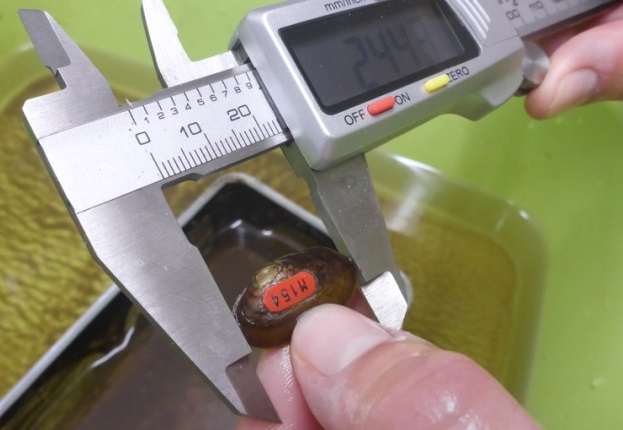 Measurement of marked freshwater pearl mussels (© Thomas Schiller)
Due to their complex lifecycle, habitat requirements and longevity, river mussels are significant bioindicators for the functionality of freshwater ecosystems. The few surviving populations of great freshwater mussels in Germany are over-aged, isolated in their habitats and genetically depleted. Funded by BMBF and BfN/BMUB, the CAWR project ArKoNaVera is focusing on the development of management measures for the sustainable establishment of the Freshwater pearl mussel (Margaritifera margaritifera) and Painter‘s mussel (Unio pictorum), which are endangered or at risk of extinction nationwide. The ultimate goal of the project is the setup of a national conservation program for both species developed in close collaboration between researchers and stakeholders.
Measurement of marked freshwater pearl mussels (© Thomas Schiller)
Due to their complex lifecycle, habitat requirements and longevity, river mussels are significant bioindicators for the functionality of freshwater ecosystems. The few surviving populations of great freshwater mussels in Germany are over-aged, isolated in their habitats and genetically depleted. Funded by BMBF and BfN/BMUB, the CAWR project ArKoNaVera is focusing on the development of management measures for the sustainable establishment of the Freshwater pearl mussel (Margaritifera margaritifera) and Painter‘s mussel (Unio pictorum), which are endangered or at risk of extinction nationwide. The ultimate goal of the project is the setup of a national conservation program for both species developed in close collaboration between researchers and stakeholders.
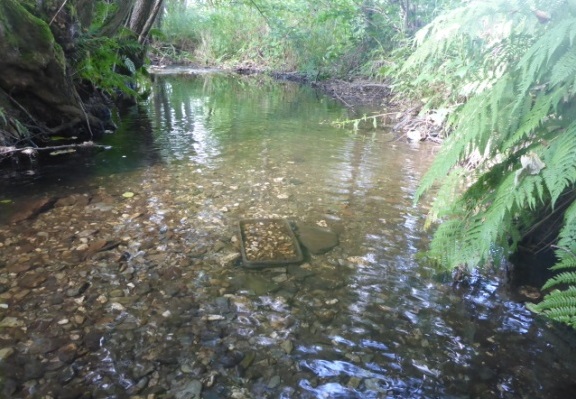 Sediment trap for the characterization of sediment mass transport (© Thomas Schiller)
Since 2016 CAWR scientists have characterized potential and existing mussel waterbodies in saxon catchments (Vogtland and Upper Lausitz Heath and Pond Landscape). A monthly monitoring approach was applied, in order to collect in-stream (physico-chemical parameters, substrate properties) and external information (characterization of sediments) in six water bodies. For 2017 the scientists are planning field studies and bioindication analysis with juvenile freshwater pearl mussels, in order to identify promising waterbodies for their resettlement.
Sediment trap for the characterization of sediment mass transport (© Thomas Schiller)
Since 2016 CAWR scientists have characterized potential and existing mussel waterbodies in saxon catchments (Vogtland and Upper Lausitz Heath and Pond Landscape). A monthly monitoring approach was applied, in order to collect in-stream (physico-chemical parameters, substrate properties) and external information (characterization of sediments) in six water bodies. For 2017 the scientists are planning field studies and bioindication analysis with juvenile freshwater pearl mussels, in order to identify promising waterbodies for their resettlement.
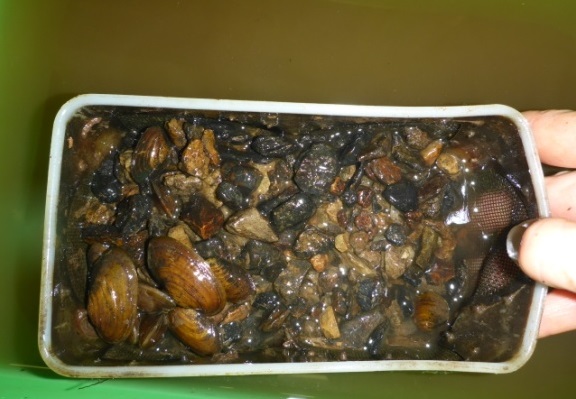 Bioindication cage with multiannual juvenile freshwater pearl mussels (© Jana Schneider)
Besides the monitoring of mussel populations for the detection of existing and released mussels, the identification of possible food resources is of primary importance and is tackled with different methods (stable isotope analysis in combination with molecular methods (DNA-Metabarcoding)). The results of the measurements will be integrated in a river mussel database as a basis for a decision support tool. The project ArKoNaVera is strengthening the cooperation of CAWR researchers from Thematic field 1. More information here.Contact:
Thomas Berendonk
,
Markus Weitere
,
Annekatrin Wagner
Bioindication cage with multiannual juvenile freshwater pearl mussels (© Jana Schneider)
Besides the monitoring of mussel populations for the detection of existing and released mussels, the identification of possible food resources is of primary importance and is tackled with different methods (stable isotope analysis in combination with molecular methods (DNA-Metabarcoding)). The results of the measurements will be integrated in a river mussel database as a basis for a decision support tool. The project ArKoNaVera is strengthening the cooperation of CAWR researchers from Thematic field 1. More information here.Contact:
Thomas Berendonk
,
Markus Weitere
,
Annekatrin Wagner
A research buoy is going on a journey to China
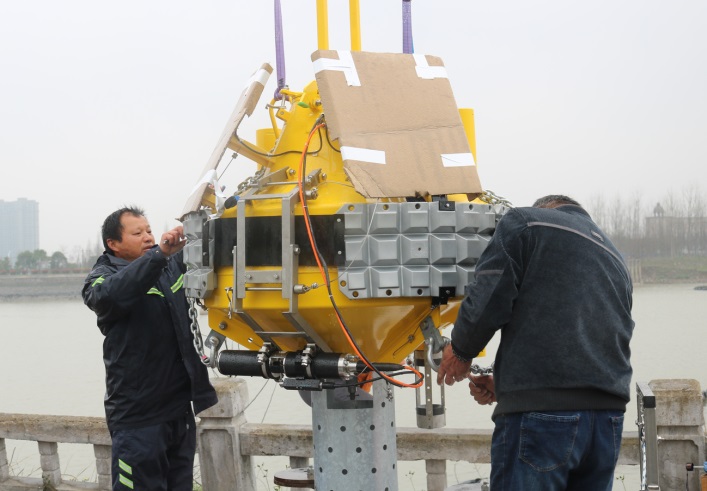 Monitoring buoy at lake Chao, © Mariecke Frassl, UFZ
Within the frame of the CAWR project “Managing Water in Urban Catchments” a research buoy has been sent to Chaohu-City in China in March, in order to ensure the monitoring of water quality at Lake Chao. The buoy was developed by CAWR scientists from the UFZ Department Lake Research in Magdeburg in collaboration with the engineers of Elektrotechnik Plischke.
Monitoring buoy at lake Chao, © Mariecke Frassl, UFZ
Within the frame of the CAWR project “Managing Water in Urban Catchments” a research buoy has been sent to Chaohu-City in China in March, in order to ensure the monitoring of water quality at Lake Chao. The buoy was developed by CAWR scientists from the UFZ Department Lake Research in Magdeburg in collaboration with the engineers of Elektrotechnik Plischke.
Within the project funded by BMBF, CAWR scientists are jointly developing sanitary and environmental engineering system solutions for sustainable water quality improvement in the city of Chaohu and Lake Chao. Lake Chao is impacted by high nutrient inputs and hence intensely eutrophicated - especially during summer there is a massive increase of blue-green algae. However Chaohu-City and surrounding areas with several million inhabitants obtain their drinking water from the lake.
The buoy facilitates the continuous measurement of different water quality parameters allowing an online monitoring of the lake’s water quality: water temperature, conductivity, chlorophyll content (total algae concentration), phycocyanin (concentration of blue-green algae), pH-value and oxygen concentration as well as meteorological variables like wind direction and velocity, air temperature, air humidity, air pressure, precipitation and radiation are also recorded.
On the one hand the buoy is designed for water quality monitoring, in order to inform the responsible water utility about the status of the lake’s raw water. On the other hand the measurements are useful for addressing different research questions, e.g. the setup of a three-dimensional lake model for simulating of the distribution of algae in Lake Chao.
More information here and here. Contact:
Karsten Rinke
,
Olaf Kolditz
Scientific Events
CAWR-Session at Dresden Nexus Conference
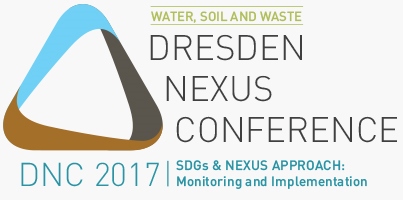 © UNU-FLORES
On Thursday May 18 a CAWR Session will take place focusing the topic “Integrated Management of Water Supply and Sanitation in water scarce areas” at the Dresden Nexus Conference. This years’ Dresden Nexus Conference is dealing with the overall topic “SDGs & Nexus Approach: Monitoring and Implementation” and has two main priority themes: “Multifunctional Land-Use-Systems” and “Resources Management in resilient cities”. More information concerning our CAWR-Session here.
© UNU-FLORES
On Thursday May 18 a CAWR Session will take place focusing the topic “Integrated Management of Water Supply and Sanitation in water scarce areas” at the Dresden Nexus Conference. This years’ Dresden Nexus Conference is dealing with the overall topic “SDGs & Nexus Approach: Monitoring and Implementation” and has two main priority themes: “Multifunctional Land-Use-Systems” and “Resources Management in resilient cities”. More information concerning our CAWR-Session here.
Dresdner Water Seminar 2017 "Water and Energy"
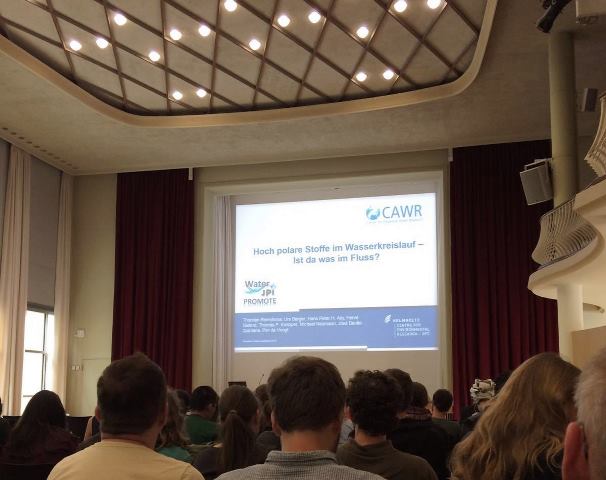 Dresdner Wasserseminar 2016 , © Greta Jäckel, UFZ
The Dresden Water Seminar will take place on June 29th, 2017 at the Dülfersaal at TU Dresden. Thematic focus of this years seminar is "Water and Energy". As in previous years different presentations held by national and international scientists are planned, in order to discuss future-oriented technologies and approaches for a sustainable water managment.
Dresdner Wasserseminar 2016 , © Greta Jäckel, UFZ
The Dresden Water Seminar will take place on June 29th, 2017 at the Dülfersaal at TU Dresden. Thematic focus of this years seminar is "Water and Energy". As in previous years different presentations held by national and international scientists are planned, in order to discuss future-oriented technologies and approaches for a sustainable water managment.
CAWR as guest at the Nexus Seminar
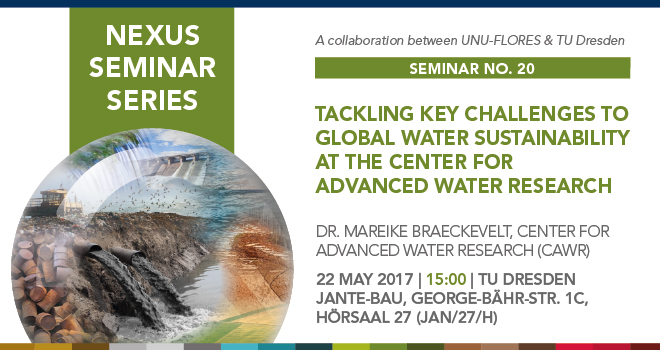 © UNU-FLORES
UNU-FLORES and the Faculty of Environmental Sciences of TU Dresden are organizing the Nexus Seminar Series taking place once a month, which is open to the public and held alternately at UNU-FLORES and TU Dresden. On May 22th, 2017 Mareike Braeckevelt will give an introduction to the key projects of CAWR and how CAWR scientists are tackling the grand challenges to global water sustainability. The joint seminar series features lectures by senior scholars that highlight all dimensions of research on the Nexus Approach, ranging from hands-on implementation strategies to theoretical debates. More information here.
© UNU-FLORES
UNU-FLORES and the Faculty of Environmental Sciences of TU Dresden are organizing the Nexus Seminar Series taking place once a month, which is open to the public and held alternately at UNU-FLORES and TU Dresden. On May 22th, 2017 Mareike Braeckevelt will give an introduction to the key projects of CAWR and how CAWR scientists are tackling the grand challenges to global water sustainability. The joint seminar series features lectures by senior scholars that highlight all dimensions of research on the Nexus Approach, ranging from hands-on implementation strategies to theoretical debates. More information here.
Water Research Horizon Conference 2017 in Hamburg
The 8th Water Research Horizon Conference (WRHC) will take place on 19/20 September 2017 at Hamburg focusing on the topic “Climate change impacts and rising adaptation needs – future challenges for water related research”. The conference will refer to water related research questions and challenges with respect to the impact of climate change on the agreed 2°C target and the need for adaptation needs and mitigation strategies. The WRHC aims at national and international scientists from various disciplines and will this year jointly be organized by the Water Science Alliance and Climate Service Center Germany (GERICS). More information here.
Transfer
CAWR as associated GRIPP partner
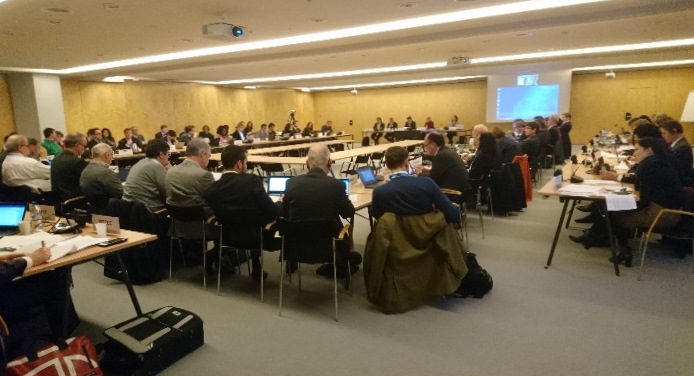 GRIPP was presented to members and partners of UN-Water on 07 Feb 2017 © GRIPP
The first face-to-face Partners’ Meeting of GRIPP (Groundwater Solutions Initiative for Policy and Practice) was held on 08-09 February in Geneva, Switzerland. The GRIPP partnership, initiated by the International Water Management Institute (IWMI), will strengthen, expand and connect current and future groundwater initiatives. CAWR scientists joined the Kick-Off-Meeting in Geneva acting as an associated partner of the GRIPP network. The meeting was used to discuss and agree on basic principles of the partnership, including the mission, structure and governance, but also to attain consensus on impact pathways and short-term actions. A day prior to the meeting, GRIPP was introduced to members and partners of UN-Water. More information here.
GRIPP was presented to members and partners of UN-Water on 07 Feb 2017 © GRIPP
The first face-to-face Partners’ Meeting of GRIPP (Groundwater Solutions Initiative for Policy and Practice) was held on 08-09 February in Geneva, Switzerland. The GRIPP partnership, initiated by the International Water Management Institute (IWMI), will strengthen, expand and connect current and future groundwater initiatives. CAWR scientists joined the Kick-Off-Meeting in Geneva acting as an associated partner of the GRIPP network. The meeting was used to discuss and agree on basic principles of the partnership, including the mission, structure and governance, but also to attain consensus on impact pathways and short-term actions. A day prior to the meeting, GRIPP was introduced to members and partners of UN-Water. More information here.
Faces of CAWR
PostDoc within the project ArKoNaVera for the protection of mussels in Germany: Sascha Krenek
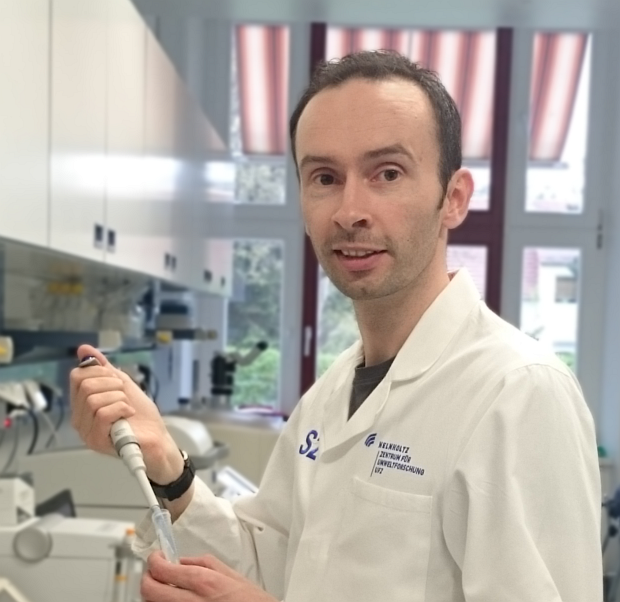 © Sascha Krenek
Since September 2015, Sascha Krenek is part of the CAWR as a postdoc within the ArKoNaVera project in joint appointment with the Department of River Ecology (UFZ) and the Institute of Hydrobiology (TU Dresden). He completed his PhD in 2011 at the University of Leipzig within the DFG priority programme Aquashift, studying thermal adaptation of eukaryotic microbes. As a molecular ecologist, he is interested in understanding evolutionary processes driving population dynamics and diversity in freshwater ecosystems. He studies these aspects using phylogenetic systematics as well as population genetics and genomics approaches. By applying experimental evolution he investigates evolutionary and ecological processes occurring in experimental populations, and can test for theoretical assumptions and predictions in ecology and evolution. His current research within the ArKoNaVera project focuses on the characterization of food resources and dietary requirements of juvenile freshwater pearl mussels as well as the development of new monitoring methods for this endangered species. The results of the applied molecular tools will help resolving the ecological niche of juvenile and adult mussels, which is needed to develop and implement conservation measures leading to a self-sustaining existence of freshwater pearl mussels in the project areas in Saxony and Bavaria. More information concerning other projects of Sascha Krenek here.
© Sascha Krenek
Since September 2015, Sascha Krenek is part of the CAWR as a postdoc within the ArKoNaVera project in joint appointment with the Department of River Ecology (UFZ) and the Institute of Hydrobiology (TU Dresden). He completed his PhD in 2011 at the University of Leipzig within the DFG priority programme Aquashift, studying thermal adaptation of eukaryotic microbes. As a molecular ecologist, he is interested in understanding evolutionary processes driving population dynamics and diversity in freshwater ecosystems. He studies these aspects using phylogenetic systematics as well as population genetics and genomics approaches. By applying experimental evolution he investigates evolutionary and ecological processes occurring in experimental populations, and can test for theoretical assumptions and predictions in ecology and evolution. His current research within the ArKoNaVera project focuses on the characterization of food resources and dietary requirements of juvenile freshwater pearl mussels as well as the development of new monitoring methods for this endangered species. The results of the applied molecular tools will help resolving the ecological niche of juvenile and adult mussels, which is needed to develop and implement conservation measures leading to a self-sustaining existence of freshwater pearl mussels in the project areas in Saxony and Bavaria. More information concerning other projects of Sascha Krenek here.

